thekiterunner追风筝的人英文介绍
- 格式:ppt
- 大小:657.50 KB
- 文档页数:10
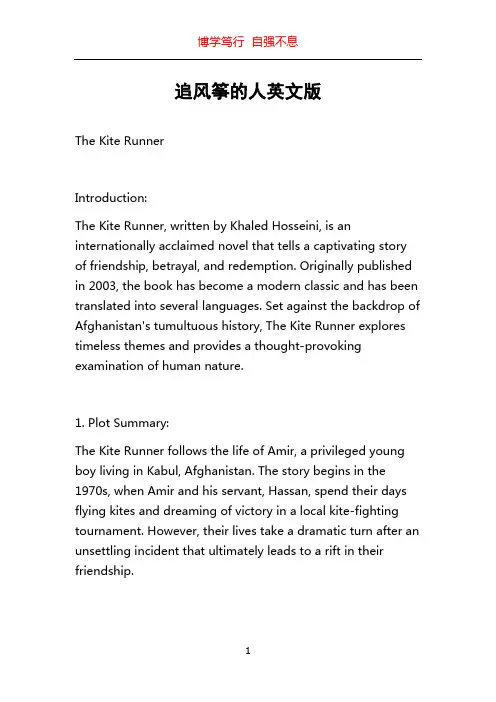
追风筝的人英文版The Kite RunnerIntroduction:The Kite Runner, written by Khaled Hosseini, is an internationally acclaimed novel that tells a captivating story of friendship, betrayal, and redemption. Originally published in 2003, the book has become a modern classic and has been translated into several languages. Set against the backdrop of Afghanistan's tumultuous history, The Kite Runner explores timeless themes and provides a thought-provoking examination of human nature.1. Plot Summary:The Kite Runner follows the life of Amir, a privileged young boy living in Kabul, Afghanistan. The story begins in the 1970s, when Amir and his servant, Hassan, spend their days flying kites and dreaming of victory in a local kite-fighting tournament. However, their lives take a dramatic turn after an unsettling incident that ultimately leads to a rift in their friendship.Amid the backdrop of the Soviet invasion and subsequent rise of the Taliban regime, Amir and his father flee Afghanistan to seek refuge in the United States. Despite their escape, Amir continues to carry the burden of guilt for his past actions. The novel follows his journey of self-discovery and his quest to find redemption, which takes him back to a war-torn Afghanistan.2. Themes:a) Friendship and Betrayal: The Kite Runner delves into the complexities of friendship and explores the consequences of betrayal. Amir's betrayal of Hassan has lasting repercussions on both their lives, highlighting the profound impact of betrayal on relationships.b) Guilt and Redemption: The novel explores the theme of guilt and how it can shape one's life. Amir's guilt over his failure to protect Hassan plagues him, leading him to seek redemption by returning to Afghanistan and facing his past.c) Father-Son Relationships: The story examines the complex dynamics between fathers and sons. Amir's strained relationship with his father, Baba, drives much of his actions, highlighting the desire for paternal approval and the impact of unspoken emotions.d) Socio-Political Climate: Set against the backdrop of Afghanistan's tumultuous history, The Kite Runner provides insights into the adverse effects of war, violence, and political turmoil on individuals and society as a whole.3. Character Analysis:a) Amir – The protagonist of the story, Amir is a complex character driven by guilt and the desire for redemption. Throughout the novel, he experiences significant growth as he confronts his past mistakes and learns valuable lessons about love, loyalty, and forgiveness.b) Hassan – Amir's best friend and servant, Hassan represents loyalty and innocence. Despite enduring hardships, Hassan remains unwavering in his devotion to Amir, ultimately embodying the qualities of a true friend.c) Baba – Amir's father, Baba, is a strong and influential figure in the story. He possesses a strong moral compass and expects the same from others, which puts pressure on Amir and shapes their strained relationship.d) Assef – A key antagonist in the novel, Assef represents the darkness and cruelty that exist in society. He serves as a symbol of the oppressive Taliban regime and poses a significant threat to Amir and Hassan's lives.4. Writing Style and Impact:Khaled Hosseini's writing style in The Kite Runner is compelling and evocative. Through vivid descriptions and emotionally charged narratives, he seamlessly transports readers into the heart of Afghanistan and the tumultuous lives of the characters. The powerful storytelling engages readers on multiple levels, provoking introspection and creating empathy for the characters' experiences.The Kite Runner has had a profound impact on readers globally. By humanizing the experiences of individuals caught in the midst of political upheaval, the novel challenges stereotypes and deepens understanding of the Afghan culture and its people. Its exploration of universal themes such as guilt, redemption, and the complexity of human relationships resonates with readers from diverse backgrounds.Conclusion:The Kite Runner is a poignant and thought-provoking novel that continues to captivate readers around the world. Through its exploration of friendship, betrayal, guilt, and redemption, it offers a deeply moving portrayal of human nature in the midst of adversity. Hosseini's masterful storytelling and rich character development make The Kite Runner a compelling read that leaves a lasting impact on its audience.。
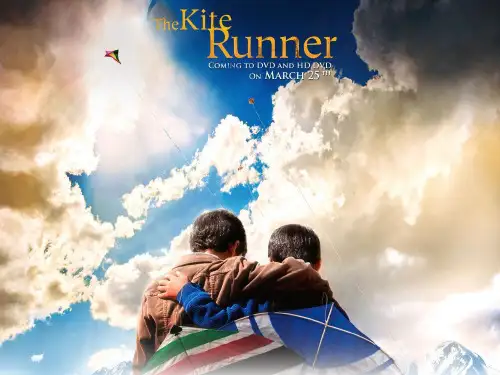
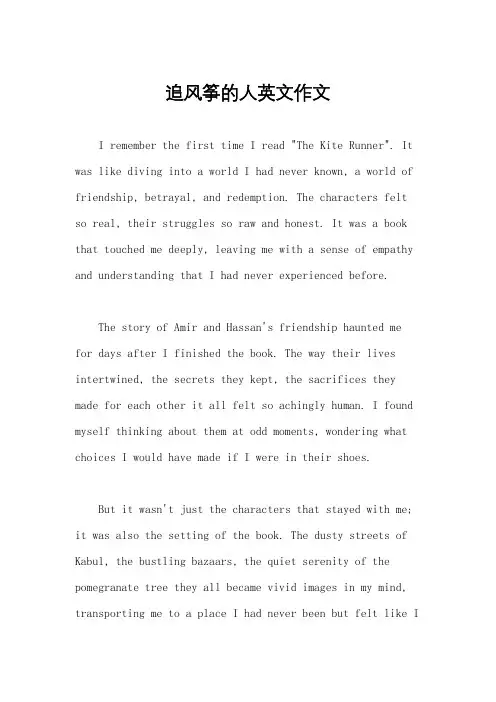
追风筝的人英文作文I remember the first time I read "The Kite Runner". It was like diving into a world I had never known, a world of friendship, betrayal, and redemption. The characters felt so real, their struggles so raw and honest. It was a book that touched me deeply, leaving me with a sense of empathy and understanding that I had never experienced before.The story of Amir and Hassan's friendship haunted mefor days after I finished the book. The way their lives intertwined, the secrets they kept, the sacrifices they made for each other it all felt so achingly human. I found myself thinking about them at odd moments, wondering what choices I would have made if I were in their shoes.But it wasn't just the characters that stayed with me; it was also the setting of the book. The dusty streets of Kabul, the bustling bazaars, the quiet serenity of the pomegranate tree they all became vivid images in my mind, transporting me to a place I had never been but felt like Iknew intimately.And then there was the theme of redemption that ran through the book like a thread, weaving together the characters' lives in unexpected ways. It made me reflect on my own actions, my own mistakes, and wonder if I could ever find the courage to make amends like Amir did.In the end, "The Kite Runner" left me with a sense of hope hope that no matter how broken we may be, no matter how many mistakes we may have made, there is always a chance for redemption, a chance to fly our kites high and free.。
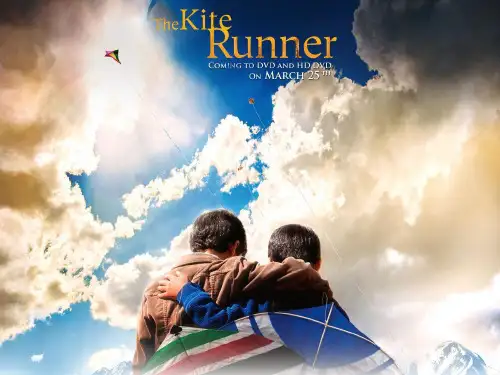

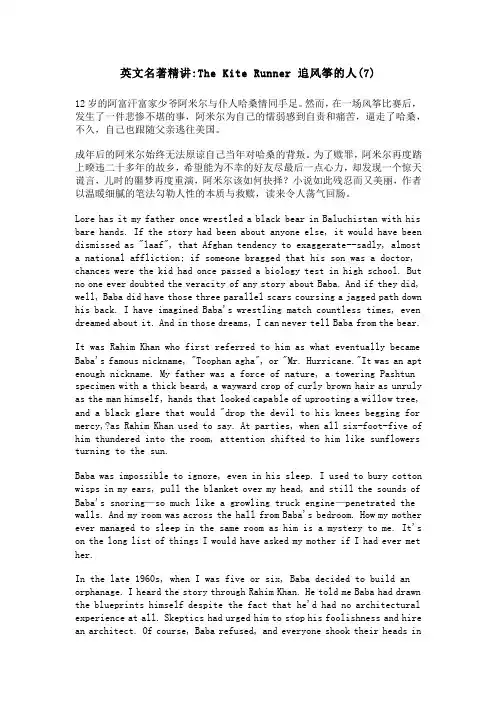
英文名著精讲:The Kite Runner 追风筝的人(7)12岁的阿富汗富家少爷阿米尔与仆人哈桑情同手足。
然而,在一场风筝比赛后,发生了一件悲惨不堪的事,阿米尔为自己的懦弱感到自责和痛苦,逼走了哈桑,不久,自己也跟随父亲逃往美国。
成年后的阿米尔始终无法原谅自己当年对哈桑的背叛。
为了赎罪,阿米尔再度踏上暌违二十多年的故乡,希望能为不幸的好友尽最后一点心力,却发现一个惊天谎言,儿时的噩梦再度重演,阿米尔该如何抉择?小说如此残忍而又美丽,作者以温暖细腻的笔法勾勒人性的本质与救赎,读来令人荡气回肠。
Lore has it my father once wrestled a black bear in Baluchistan with his bare hands. If the story had been about anyone else, it would have been dismissed as "laaf", that Afghan tendency to exaggerate--sadly, almost a national affliction; if someone bragged that his son was a doctor, chances were the kid had once passed a biology test in high school. But no one ever doubted the veracity of any story about Baba. And if they did, well, Baba did have those three parallel scars coursing a jagged path down his back. I have imagined Baba's wrestling match countless times, even dreamed about it. And in those dreams, I can never tell Baba from the bear.It was Rahim Khan who first referred to him as what eventually became Baba's famous nickname, "Toophan agha", or "Mr. Hurricane."It was an apt enough nickname. My father was a force of nature, a towering Pashtun specimen with a thick beard, a wayward crop of curly brown hair as unruly as the man himself, hands that looked capable of uprooting a willow tree, and a black glare that would "drop the devil to his knees begging for mercy,?as Rahim Khan used to say. At parties, when all six-foot-five of him thundered into the room, attention shifted to him like sunflowers turning to the sun.Baba was impossible to ignore, even in his sleep. I used to bury cotton wisps in my ears, pull the blanket over my head, and still the sounds of Baba's snoring—so much like a growling truck engine—penetrated the walls. And my room was across the hall from Baba's bedroom. How my mother ever managed to sleep in the same room as him is a mystery to me. It's on the long list of things I would have asked my mother if I had ever met her.In the late 1960s, when I was five or six, Baba decided to build an orphanage. I heard the story through Rahim Khan. He told me Baba had drawn the blueprints himself despite the fact that he'd had no architectural experience at all. Skeptics had urged him to stop his foolishness and hire an architect. Of course, Baba refused, and everyone shook their heads indismay at his obstinate ways. Then Baba succeeded and everyone shook their heads in awe at his triumphant ways. Baba paid for the construction of the two-story orphanage, just off the main strip of Jadeh Maywand south of the Kabul River, with his own money. Rahim Khan told me Baba had personally funded the entire project, paying for the engineers, electricians, plumbers, and laborers, not to mention the city officials whose "mustaches needed oiling."重点精讲:wrestle v. 摔跤He wrestled his opponent to the floor/ground.他把对手摔倒在地上。
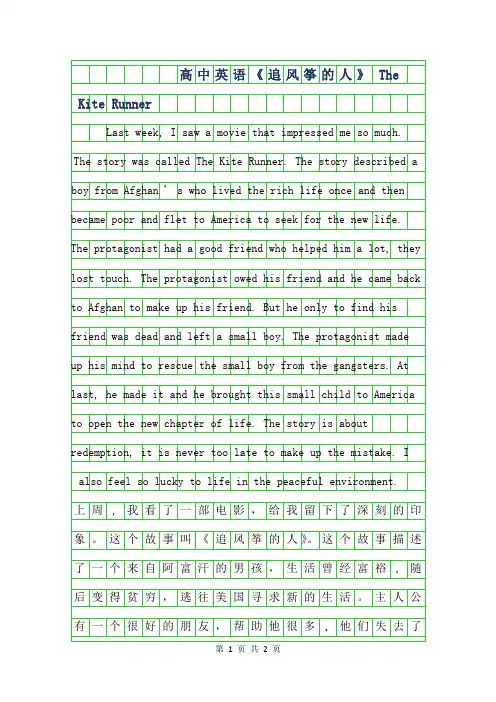
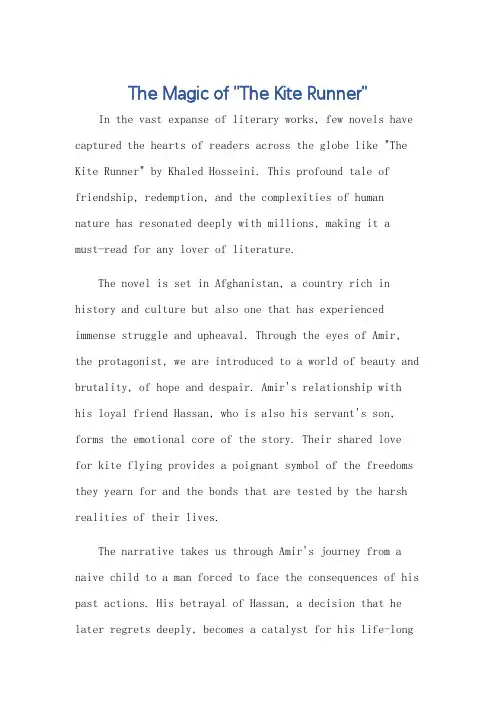
The Magic of "The Kite Runner"In the vast expanse of literary works, few novels have captured the hearts of readers across the globe like "The Kite Runner" by Khaled Hosseini. This profound tale of friendship, redemption, and the complexities of human nature has resonated deeply with millions, making it a must-read for any lover of literature.The novel is set in Afghanistan, a country rich in history and culture but also one that has experienced immense struggle and upheaval. Through the eyes of Amir, the protagonist, we are introduced to a world of beauty and brutality, of hope and despair. Amir's relationship with his loyal friend Hassan, who is also his servant's son, forms the emotional core of the story. Their shared lovefor kite flying provides a poignant symbol of the freedoms they yearn for and the bonds that are tested by the harsh realities of their lives.The narrative takes us through Amir's journey from a naive child to a man forced to face the consequences of his past actions. His betrayal of Hassan, a decision that he later regrets deeply, becomes a catalyst for his life-longquest for redemption. This quest leads him back to Afghanistan, where he must reconcile with his past and find a way to atone for his sins.The beauty of "The Kite Runner" lies in its ability to tell auniversal story of human struggle and redemption through the specific cultural and historical context of Afghanistan. Hosseini's writing is both powerful and poetic, painting vivid pictures of the landscapes, people, and traditions of his homeland. He captures the essence of what it means to be human, the pain and joy, the triumphs and failures, the love and loss that are all part of the human experience.Moreover, the novel's themes of loyalty, friendship,and the importance of family are timeless and universal. They resonate with readers regardless of their backgroundor culture, making "The Kite Runner" a truly global phenomenon.In conclusion, "The Kite Runner" is not just a book;it's an experience. It's a journey through the complexities of the human heart, a powerful reminder of the impact our actions can have on others, and a beautiful testament tothe resilience of the human spirit. If you're looking for a book that will leave you breathless, filled with emotion, and profoundly moved, look no further than "The Kite Runner".**《追风筝的人》的魔力**在浩如烟海的文学作品中,很少有像卡勒德·胡赛尼的《追风筝的人》这样的小说能够深深捕获全球读者的心。
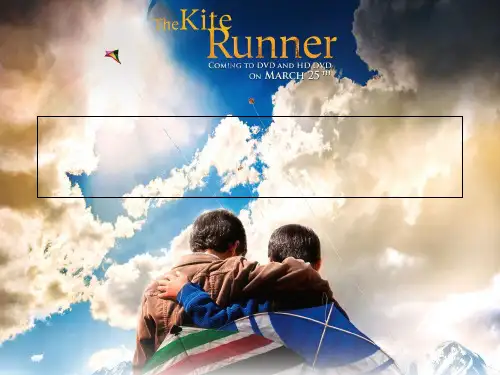
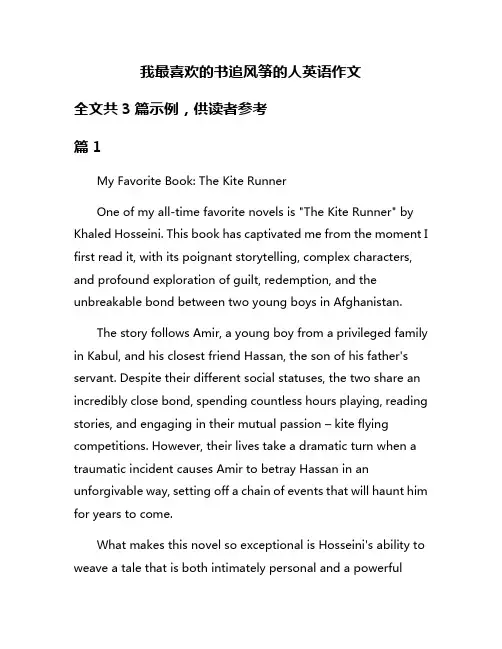
我最喜欢的书追风筝的人英语作文全文共3篇示例,供读者参考篇1My Favorite Book: The Kite RunnerOne of my all-time favorite novels is "The Kite Runner" by Khaled Hosseini. This book has captivated me from the moment I first read it, with its poignant storytelling, complex characters, and profound exploration of guilt, redemption, and the unbreakable bond between two young boys in Afghanistan.The story follows Amir, a young boy from a privileged family in Kabul, and his closest friend Hassan, the son of his father's servant. Despite their different social statuses, the two share an incredibly close bond, spending countless hours playing, reading stories, and engaging in their mutual passion – kite flying competitions. However, their lives take a dramatic turn when a traumatic incident causes Amir to betray Hassan in an unforgivable way, setting off a chain of events that will haunt him for years to come.What makes this novel so exceptional is Hosseini's ability to weave a tale that is both intimately personal and a powerfulcommentary on the political and social turmoil of Afghanistan. The story spans several decades, from the peaceful days of Amir's childhood in the 1970s, through the Soviet invasion, the rise of the Taliban, and ultimately to his return to Kabul after seeking refuge in America.Through Amir's eyes, we witness the devastating effects of war, displacement, and the erosion of human rights. Yet, at its core, "The Kite Runner" is a profoundly human story, exploring the complexities of father-son relationships, the guilt and consequences of moral choices, and the enduring power of friendship and loyalty.One of the aspects that resonated most deeply with me was the portrayal of the relationship between Amir and Hassan. Their bond transcended social barriers, and their shared love for kite flying symbolized a sense of freedom and joy amidst the harsh realities of their lives. Hassan's unwavering loyalty and selflessness, even in the face of Amir's betrayal, left an indelible mark on my heart, serving as a poignant reminder of the capacity for unconditional love and forgiveness.Hosseini's writing is both poetic and visceral, painting vivid pictures of the sights, sounds, and smells of Afghanistan. His characters are richly drawn and multi-layered, each with theirown flaws, strengths, and motivations. Amir's journey, in particular, is a powerful exploration of guilt, redemption, and the pursuit of atonement. His ultimate decision to return to Afghanistan and risk everything to right the wr篇2My Favorite Book: The Kite Runner by Khaled HosseiniIf someone asked me to name my all-time favorite book, I would answer without hesitation - "The Kite Runner" by Khaled Hosseini. This powerful novel has captured my heart and mind like no other, and every time I revisit its pages, I find myself swept away by the sheer brilliance of Hosseini's storytelling.The novel transports readers to Afghanistan, a country rich in culture and history, yet torn apart by conflict and turmoil. Through the eyes of the protagonist, Amir, we witness the unbreakable bond between two young boys, Amir and Hassan, and the devastating consequences of a single, tragic betrayal that haunts Amir for years to come.What truly resonates with me is the depth of emotion that Hosseini weaves into every page. The complex relationship between Amir and Hassan is a masterclass in exploring themes of loyalty, guilt, and redemption. As Amir grapples with the weightof his actions, we are taken on a journey of self-discovery, where he must confront the demons of his past and ultimately find the courage to atone for his sins.Hosseini's prose is nothing short of poetic, painting vivid images of the Afghan landscape and the lives of its people. From the vibrant kite-flying tournaments that serve as a backdrop for the story to the harrowing depictions of the Taliban's oppressive regime, every detail is rendered with a level of authenticity that draws the reader in and refuses to let go.One aspect that particularly resonates with me is the exploration of the father-son dynamic between Amir and his father, Baba. Their strained relationship and Amir's constant struggle for his father's approval strike a chord with many readers, myself included. Hosseini masterfully captures the complexities of familial bonds and the lasting impact they can have on our lives.Beyond the gripping narrative, "The Kite Runner" also serves as a powerful commentary on the human condition. It delves into themes of friendship, betrayal, guilt, and the pursuit of redemption, offering a profound exploration of the choices we make and the consequences that follow. Hosseini's ability toweave these universal themes into a deeply personal story is what truly sets this novel apart.Furthermore, the book serves as a poignant reminder of the resilience of the human spirit. Despite the atrocities and hardships endured by the characters, there is always a glimmer of hope, a desire to overcome and rise above adversity. This resonates deeply with me, as it encourages readers to find strength in the face of challenges and to never lose sight of the power of forgiveness and redemption.It would be an understatement to say that "The Kite Runner" has had a profound impact on me. Beyond being a literary masterpiece, it has taught me valuable lessons about life, love, and the human experience. It has challenged me to confront my own biases and preconceptions, and to embrace the complexities of the world around us.In a world that often seems divided and filled with conflict, this novel serves as a powerful reminder of our shared humanity and the importance of empathy and understanding. It is a testament to the power of storytelling and its ability to transcend cultural boundaries and touch the hearts of readers from all walks of life.Whether you are a seasoned reader or someone just embarking on their literary journey, I cannot recommend "The Kite Runner" highly enough. It is a book that will stay with you long after you turn the final page, leaving an indelible mark on your heart and mind. So, if you haven't already, pick up a copy and prepare to be swept away by Hosseini's captivating tale of friendship, betrayal, and the unwavering pursuit of redemption.篇3My Favorite Book: The Kite RunnerHave you ever read a book that left an indelible mark on your soul? A book that made you laugh, cry, and ponder the depths of human nature? For me, that book is "The Kite Runner" by Khaled Hosseini. This heartbreaking yet beautifully written novel has become my all-time favorite, and I'd like to share with you why it holds such a special place in my heart.The Kite Runner is a poignant tale of friendship, betrayal, guilt, redemption, and the unbreakable bonds of family. Set in Afghanistan, it follows the lives of Amir and Hassan, two young boys from different social classes who form an unlikely friendship. Despite their disparate backgrounds, they share adeep bond over their love for kite fighting, a popular pastime in Kabul.From the very first pages, Hosseini's vivid prose transported me to the dusty streets of Kabul, where I could almost smell the fragrant air and feel the heat of the sun on my face. His descriptions were so rich and evocative that I found myself completely immersed in the story's setting, as if I were witnessing the events unfold before my eyes.But it was the characters that truly captivated me. Amir, the protagonist, is a deeply flawed and complex individual. As a young boy, he struggles with the jealousy he feels towards his best friend, Hassan, who is the son of his father's servant. This jealousy leads him to commit an unforgivable act of betrayal, one that haunts him for the rest of his life. Hosseini's portrayal of Amir's internal conflict and guilt is so raw and honest that it resonated with me on a profound level.Hassan, on the other hand, is a pure and innocent soul, loyal to a fault. Despite the cruelty he endures, he never loses his kindness and compassion. His unwavering devotion to Amir, even after the betrayal, is both heartbreaking and inspiring. Hassan represents the best of humanity, reminding us that even in the darkest of times, there is always hope for redemption.The novel's exploration of the father-son relationship is also deeply moving. Amir's strained relationship with his father, Baba, is a central theme throughout the book. Baba is a complex character, torn between his love for his son and his disappointment in Amir's perceived cowardice. Their journey towards understanding and forgiveness is a powerful testament to the enduring bonds of family.But what truly sets "The Kite Runner" apart is its ability to capture the devastating impact of war and political unrest on ordinary lives. As the story progresses, we witness the fall of Afghanistan to the Soviet invasion and the rise of the Taliban regime. Hosseini's depiction of these events is both heartbreaking and eye-opening, reminding us of the resilience of the human spirit in the face of unimaginable adversity.One of the most poignant scenes in the book is when Amir returns to Kabul after years of living in America. The once-vibrant city he knew as a child is now a shadow of its former self, ravaged by war and oppression. Hosseini's descriptions of the devastation are haunting, and I found myself struggling to hold back tears as I read about the suffering endured by the Afghan people.Yet, amidst the darkness, there are glimmers of hope and redemption. Amir's journey to atone for his past sins and search for redemption is a powerful reminder that it's never too late to make amends and seek forgiveness. His willingness to risk everything to right the wrongs of his past is both inspiring and humbling.Hosseini's writing is not only emotionally charged but also beautifully crafted. His use of imagery, metaphor, and symbolism enriches the narrative and adds layers of depth to the storytelling. The kite Runner itself serves as a powerful symbol throughout the novel, representing freedom, childhood innocence, and the unbreakable bond between Amir and Hassan.Overall, "The Kite Runner" is a masterpiece of contemporary literature. It is a story that transcends cultural boundaries and speaks to the universal themes of love, loss, guilt, and redemption. Hosseini's ability to weave together a gripping narrative with profound insights into the human condition is truly remarkable.This book has left an indelible mark on my heart and mind. It has challenged me to confront difficult truths about human nature, while also inspiring me to seek redemption and forgiveness in my own life. It has reminded me of the resilienceof the human spirit and the power of friendship and family to overcome even the most formidable obstacles.If you haven't read "The Kite Runner" yet, I implore you to do so. It is a book that will stay with you long after you've turned the final page, a testament to the transformative power of literature. And who knows? Perhaps, like me, you'll find yourself falling in love with this remarkable story and making it your favorite book of all time.。
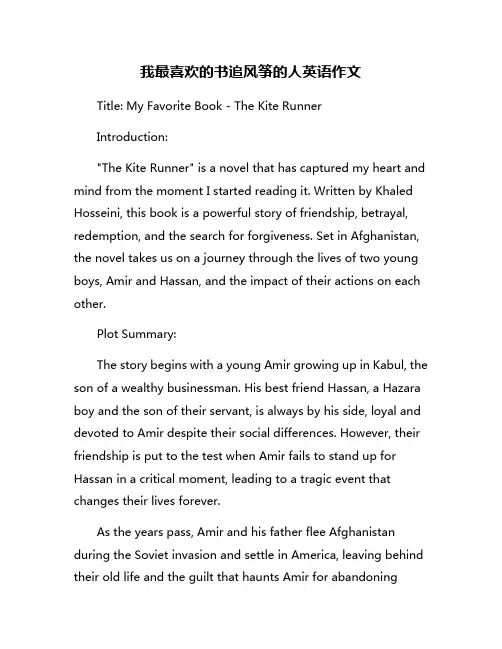
我最喜欢的书追风筝的人英语作文Title: My Favorite Book - The Kite RunnerIntroduction:"The Kite Runner" is a novel that has captured my heart and mind from the moment I started reading it. Written by Khaled Hosseini, this book is a powerful story of friendship, betrayal, redemption, and the search for forgiveness. Set in Afghanistan, the novel takes us on a journey through the lives of two young boys, Amir and Hassan, and the impact of their actions on each other.Plot Summary:The story begins with a young Amir growing up in Kabul, the son of a wealthy businessman. His best friend Hassan, a Hazara boy and the son of their servant, is always by his side, loyal and devoted to Amir despite their social differences. However, their friendship is put to the test when Amir fails to stand up for Hassan in a critical moment, leading to a tragic event that changes their lives forever.As the years pass, Amir and his father flee Afghanistan during the Soviet invasion and settle in America, leaving behind their old life and the guilt that haunts Amir for abandoningHassan. But when an old family friend reaches out to him, asking him to return to Afghanistan, Amir is forced to confront his past and seek redemption for his actions.Themes:"The Kite Runner" explores themes of friendship, loyalty, guilt, and the long-lasting impact of our choices. It delves into the complexities of relationships and the consequences of betrayal, but also offers hope for forgiveness and second chances. Hosseini's writing is poignant and evocative, drawing readers into the rich tapestry of Afghan culture and the struggles of its people.Character Development:One of the most compelling aspects of the novel is the growth and development of the characters, particularly Amir. Through his journey of self-discovery and redemption, we see Amir grapple with his past mistakes and strive to make amends for the pain he has caused. His complex relationship with Hassan and his father adds layers to his character, showing the depth of his emotions and the struggles he faces in reconciling his actions.Conclusion:"The Kite Runner" is a book that has left a lasting impression on me, not only for its gripping storyline and well-crafted characters but also for its powerful themes of forgiveness and redemption. Through Amir's journey, we are reminded of the importance of owning up to our mistakes, seeking forgiveness, and finding the courage to make amends for the wrongs we have done. This timeless tale of friendship and redemption is one that will stay with me for years to come.。
The Enchantment of "The Kite Runner"In the vast landscape of literary works, few novels have captured the hearts of readers across the globe as powerfully as "The Kite Runner" by Khaled Hosseini. This profound novel, set against the backdrop of Afghanistan's tumultuous history, tells a tale of friendship, redemption, and the enduring power of human connections.The story revolves around Amir, a young boy growing up in Kabul during the 1970s. Amir's relationship with his loyal friend, Hassan, forms the emotional core of the narrative. Hassan, a Hazara boy, is a victim of thesocietal prejudices that tear Afghanistan apart. Despite their differences, the boys form a strong bond, kite flying being their favorite pastime. However, a tragic incident involving a kite competition and Hassan's subsequent silence shatters Amir's innocence and leads him to seek refuge in America, leaving his past behind.Years later, Amir is forced to return to Afghanistan when he receives a letter from an old friend告知他Hassan's tragic fate. This revelation ignites a fire within him, compelling him to embark on a journey of redemptionthat leads him back to the place he once tried to escape. Amir's journey is not only a physical one; it's also an emotional odyssey that tests his resolve and pushes him to confront his deepest fears and regrets.The beauty of "The Kite Runner" lies in its ability to tell a universal story of guilt, redemption, and the transformative power of love and compassion. Through Amir's journey, Hosseini powerfully illustrates the impact of our actions on others and the consequences of ignoring our conscience. The novel also highlights the resilience of the human spirit, even in the face of overwhelming adversity.The characters in "The Kite Runner" are brilliantly crafted, each with their own unique traits and complexities. Amir, in particular, is a complex protagonist whose flaws and insecurities make him all the more relatable. His struggle to overcome his past and find redemption is both heartbreaking and inspiring. Hassan, on the other hand, isa symbol of unconditional love and loyalty, his character embodying the best of humanity.The writing style of Khaled Hosseini is captivating,with a beautiful blend of poetry and prose. His descriptionof Kabul, both its beauty and its ugliness, is vivid and heartfelt, making the reader feel as if they are there alongside the characters. The narrative flows seamlessly, taking the reader through a rollercoaster of emotions that leave a lasting impact."The Kite Runner" is not just a book; it's an experience. It's a reminder of the power of our actions and the impact they have on others. It's a call to action, urging us to face our fears, own our mistakes, and seek redemption wherever it may lead us. It's a testament to the resilience of the human spirit and the transformative power of love and compassion.If you're looking for a book that will leave you emotionally drained but also incredibly enriched, "The Kite Runner" is the perfect choice. It's a must-read for anyone who loves literature, enjoys a heartfelt tale of human connections, or simply wants to be reminded of the goodthat can still be found in the world.**《追风筝的人》的魅力**在浩如烟海的文学作品中,很少有小说能像卡勒德·胡赛尼的《追风筝的人》那样,深深地触动全球读者的心。
我最喜欢的一本书追风筝的人英语作文My Favorite Book: The Kite RunnerYou know how some books just stick with you? Like they become a part of you and you can't forget them no matter how hard you try? That's how I feel about "The Kite Runner" by Khaled Hosseini. It's this amazing story that I read for a school assignment, but it turned out to be so much more than just another book report.The book is all about these two best friends named Amir and Hassan who grew up together in Kabul, Afghanistan back before the wars and all the fighting happened there. Amir is the son of a rich man named Baba, and Hassan is the son of Baba's servant Ali. Even though Hassan is supposed to be just a servant, him and Amir are super close and do everything together. They play games, go on adventures, and Hassan is always there to protect Amir no matter what.But here's the sad part - Amir makes a terrible mistake when they are kids. He sees Hassan getting brutally attacked by some bullies, but he doesn't do anything to stop it because he's too scared. After that, Amir becomes consumed by guilt and hedrives Hassan and his father away using lies. It's a decision that haunts Amir for his entire life.Years later, Amir and Baba have to flee to America as refugees when the wars start in Afghanistan. Amir grows up and gets married, but he can never forget about the way he failed his best friend Hassan. Then one day, Amir gets a call from an old family friend who tells him that Hassan has a son named Sohrab who has ended up in an orphanage in the middle of the war zone back in Kabul. Amir realizes this is his chance to make things right, so he travels back to Afghanistan which is now under Taliban rule.What happens next is just mind-blowing. Amir has to face extreme dangers, he sees unbelievable tragedies of war, and he risks everything to find Sohrab and bring him back home to America. There's heroism, redemption, friendship that survives across decades, and some of the most heart-wrenching moments I've ever experienced in a book. I don't want to give away too many spoilers, but let's just say I cried like a baby at certain parts!For me, "The Kite Runner" is amazing for so many reasons. First of all, the story itself is gripping and intense - I just could not put the book down because I had to know what happenednext. But it's also deep and makes you think really hard about important ideas like loyalty, forgiveness, sacrifice, and atoning for your mistakes.I love how well the author depicts the friendship between Amir and Hassan too. They loved each other like brothers even though society saw them as from different classes. Their bond was so real and honest on the pages.The book also teaches you a lot about the history and culture of Afghanistan in an engaging way through the eyes of the characters. I learned so much about Afghani traditions, poetry, social classes, and what life was like before the wars. It's the kind of book that really transports you to a different time and place.But most of all, "The Kite Runner" is profound because of how it deals with extremely difficult themes like cruelty, redemption, and the scars that violence and war leave on the human soul. It's an emotional rollercoaster as Amir has to confront his darkest memories and his own cowardice from the past. By the end, I just felt that Amir's struggle to find forgiveness and peace within himself was one of the most powerful things I've ever read.For a book that seems so simple on the surface about two boyhood friends, "The Kite Runner" packs an unbelievable punch. It made me experience pretty much every human emotion possible! I loved it, I hated it, it broke my heart, it made me cheer, it made me cry. Books aren't supposed to affect you that way, but this one most definitely did.I can't recommend "The Kite Runner" enough. It's an absolute must-read for people of all ages. Even though it deals with some very heavy topics, it is ultimately a beautifully written book about the unconquerable human spirit. It will leave you thinking about friendship, redemption, forgiveness, and family in completely new ways. Just make sure you have a box of tissues nearby because you will need them!。
英文名著精讲:The Kite Runner 追风筝的人(2)12岁的阿富汗富家少爷阿米尔与仆人哈桑情同手足。
然而,在一场风筝比赛后,发生了一件悲惨不堪的事,阿米尔为自己的懦弱感到自责和痛苦,逼走了哈桑,不久,自己也跟随父亲逃往美国。
成年后的阿米尔始终无法原谅自己当年对哈桑的背叛。
为了赎罪,阿米尔再度踏上暌违二十多年的故乡,希望能为不幸的好友尽最后一点心力,却发现一个惊天谎言,儿时的噩梦再度重演,阿米尔该如何抉择?小说如此残忍而又美丽,作者以温暖细腻的笔法勾勒人性的本质与救赎,读来令人荡气回肠。
CHAPTER TWOWhen we were children, Hassan and I used to climb the poplar trees in the driveway of my father's house and annoy our neighbors by reflecting sunlight into their Homes with a shard of mirror. We would sit across from each other on a pair of high branches, our naked feet dangling, our trouser pockets filled with dried mulberries and walnuts. We took turns with the mirror as we ate mulberries, pelted each other with them, giggling, laughing; I can still see Hassan up on that tree, sunlight flickering through the leaves on his almost perfectly round face, a face like a Chinese doll chiseled from hardwood: his flat, broad nose and slanting, narrow eyes like bamboo leaves, eyes that looked, depending on the light, gold, green, even sapphire. I can still see his tiny low-set ears and that pointed stub of a chin, a meaty appendage that looked like it was added as a mere afterthought. And the cleft lip, just left of midline, where the Chinese doll maker's instrument may have slipped; or perhaps he had simply grown tired and careless.Sometimes, up in those trees, I talked Hassan into firing walnuts with his slingshot at the neighbor's one-eyed German shepherd. Hassan never wanted to, but if I asked, "really"asked, he wouldn't deny me. Hassan never denied me anything. And he was deadly with his slingshot. Hassan's father, Ali, used to catch us and get mad, or as mad as someone as gentle as Ali could ever get. He would wag his finger and wave us down from the tree. He would take the mirror and tell us what his mother had told him, that the devil shone mirrors too, shone them to distract Muslims during prayer. "And he laughs while he does it,?he always added, scowling at his son."Yes, Father,"Hassan would mumble, looking down at his feet. But he never told on me. Never told that the mirror, like shooting walnuts at the neighbor's dog, was always my idea.The poplar trees lined the redbrick driveway, which led to a pair of wrought-iron gates. They in turn opened into an extension of the driveway into my father's estate. The house sat on the left side of the brick path, the backyard at the end of it.Everyone agreed that my father, my Baba, had built the most beautiful house in the Wazir Akbar Khan district, a new and affluent neighborhood in the northern part of Kabul. Some thought it was the prettiest house in all of Kabul. A broad entryway flanked by rosebushes led to the sprawling house of marble floors and wide windows. Intricate mosaic tiles, handpicked by Baba in Isfahan, covered the floors of the four bathrooms. Gold-stitched tapestries, which Baba had bought in Calcutta, lined the walls; a crystal chandelier hung from the vaulted ceiling.重点精讲:driveway n.车道annoy vt.搅扰,骚扰,干扰,使生气These flies are annoying me.这些苍蝇一直在打搅我。
我最喜欢的书追风筝的人英语作文One of my favorite books is "The Kite Runner" by Khaled Hosseini. This novel tells the story of Amir, a young boy from Kabul, Afghanistan and his journey of redemption and forgiveness.The story begins with Amir and his childhood friend, Hassan, growing up in Kabul. They have a unique bond, but Amir's jealousy and cowardice ultimately lead to a betrayal that changes their lives forever. As the Soviet invasion of Afghanistan forces Amir and his father to flee to the United States, the guilt of his past actions haunts Amir for years.Years later, Amir is given the chance to redeem himself when he learns that Hassan's son is in danger. He returns to Afghanistan to confront his past and make amends for the mistakes he made. Through his journey, Amir learns the true meaning of loyalty, bravery, and forgiveness.What I love most about "The Kite Runner" is its powerful storytelling and complex characters. Hosseini's vivid descriptions of Kabul and the Afghan culture immerse the reader in Amir's world, making the emotional impact of the story even moreprofound. The themes of friendship, betrayal, and redemption resonate with readers of all ages and backgrounds.Overall, "The Kite Runner" is a beautifully written and emotionally gripping novel that stays with you long after you've finished reading it. It's a timeless story of love, guilt, and the power of forgiveness that reminds us of the importance of second chances. I highly recommend this book to anyone looking for a thought-provoking and moving read.。
我最喜欢的书追风筝的人英语作文My Favorite Book: The Kite RunnerI really love the book The Kite Runner by Khaled Hosseini. It's such an amazing story that makes me feel so many different emotions. I laughed, I cried, I felt scared, and I felt really happy too. It's definitely my all-time favorite book!The Kite Runner is about two best friends named Amir and Hassan who live in Kabul, Afghanistan in the 1970s before the wars started there. Amir is the narrator and he comes from a wealthy family, while Hassan is the son of Amir's father's servant so he's not as rich. But even though they come from different backgrounds, Amir and Hassan are inseparable. They love going outside to run around, play games, and fly kites together. Kite flying is like the biggest thing in Kabul and there's even a tournament every year.Hassan is an amazing kite runner. That means when the kites get cut down during the fights, he's able to run across rooftops and dodge all the dangers in the streets to get the kites for Amir. Amir isn't as brave or athletic as Hassan, but he's really good at figuring out kite battle strategies and he has a special talent forgetting the kite strings just right. So together they make an incredible kite fighting team.But there's a horrible incident that happens one day after Amir finally wins the big kite tournament. It's too upsetting for me to go into all the details, but basically Amir makes a terrible decision that ends up ruining his friendship with Hassan and their lives are never the same after that. Amir has to live with the guilt over what he did for years and years.Years later, Amir and his father have to flee Afghanistan because of the wars and the Taliban taking over. They move to America as refugees and start a new life there. But Amir is still haunted by the memories of the past and what happened with Hassan back in Kabul. He gets a chance to maybe redeeem himself when an old family friend asks him to return to Afghanistan on a mission to find Hassan's son who is now an orphan.So Amir goes back to the country he fled from as a grown man, and he has to be brave and take huge risks to try to make things right. I don't want to give away too much of what happens, but there's still more tragedy, more guilt, and some shocking revelations. But there's also redemption, forgiveness, andeventually healing for Amir. By the end, he has become at peace with his past.I love the story of The Kite Runner because even though there are some extremely sad, disturbing, and violent parts, overall it's a powerful story about true friendship, the importance of standing up for what's right, and being able to forgive yourself. It shows that people can make terrible mistakes but they can also find a way to redeem themselves and become better people.The characters are so well-developed and real, especially Amir and Hassan. Their relationship and how it changes over time is the heart of the book. Hassan is one of the mostpure-hearted, loyal people you'll ever read about. He always does the right thing and completely forgives Amir even after the unforgivable thing Amir did. Amir is flawed and makes mistakes, but you can understand why he does what he does and you want him to be able to find peace.Khaled Hosseini's writing is so descriptive and beautiful too. He really makes you feel like you're right there in Afghanistan, from the peaceful early scenes of Amir's childhood to thewar-torn devastation later on. His description of the kite flying scenes are like works of art. You can vividly picture the kitesdancing in the sky as Amir tries to cut the strings. You can feel the wind and the tension.The Kite Runner was published in 2003 and it was Khaled Hosseini's first novel. It ended up becoming an international bestseller and being translated into over 40 languages. There was also a really good movie made based on the book too. But I think I liked the book even more than the movie because it was able to capture all the details and emotions even better.I first read The Kite Runner last year when I was 10 years old. Some parts were a little confusing for me at that age and some parts were disturbing, but my teacher helped explain things and told me which sections I could skip over if it was too upsetting. But I was still able to understand and appreciate the core story and themeseven as a kid.The Kite Runner taught me so much about friendship, redemption, forgiveness, and standing up against injustice. It showed me the real-life struggles and violence that people have had to endure in a country like Afghanistan which most kids like me don't really know much about. It opened my eyes to other cultures and also made me value the peace and privileges I have in my own life. It's an extremely powerful yet beautiful story that I think every kid and adult should read.I've probably read The Kite Runner like 4 or 5 times already and I know I'll read it over and over again as I get older. Each time I read it, I discover new layers and meanings. It's one of those really special books that becomes embedded in your heart and mind forever. The Kite Runner will always be my favorite book of all time. I just love it so much!。
我想推荐的书英文作文英文回答:I would like to recommend the book "The Kite Runner" by Khaled Hosseini. This is a powerful and moving story about two boys, Amir and Hassan, who grow up in Kabul, Afghanistan. The story follows them through their childhood, adolescence, and into adulthood, as they grapple with the complexities of friendship, loyalty, and betrayal. "TheKite Runner" is a beautifully written novel that will stay with you long after you finish it. It is a must-read for anyone who wants to understand the human condition.Another book that I would highly recommend is "To Killa Mockingbird" by Harper Lee. This is a classic American novel that tells the story of Scout Finch, a young girl who comes of age in the American South during the 1930s. "ToKill a Mockingbird" is a powerful and moving story about racism, prejudice, and justice. It is a must-read for anyone who wants to understand the American experience.中文回答:我推荐的书是《追风筝的人》,作者是阿富汗作家卡勒德·胡赛尼。